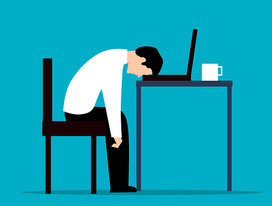 Stressed employee Stressed employee
Feeling overworked, having conflict with managers, and experiencing low job satisfaction can all cause stress and anxiety. Talking to friends, family, or even your psychologist can help you feel better, but you may need to do more to change your situation. Here are five tips for dealing with work-related stress.
1. Learn now to say no. Saying no to things that are voluntary or unnecessary will free up your time to do things that improve your mood. Having time for yourself and your interests is beneficial for your mental health (you can read more in this blog entry). Saying no can be difficult if you focus too much on pleasing people. If you learn assertiveness skills and practice them, you will find it easier to say no.
2. Talk to your boss or manager. Sometimes your situation can improve if you tell others what is bothering you and what you want changed. Your boss/manager may be unaware that you hate a given task, or that you want to change your focus at work. Expecting other people to read your mind may leave you disappointed. This is another tip that requires assertive communication to express your needs in a respectful way. Think about your specific needs, requests, and goals before approaching your boss or manager—that way you’ll make the best use of everyone’s time. In some situations, your HR department may be involved if there are serious conflicts in your workplace. In some situations, you may need to make a human rights complaint or even consult a lawyer if you are being harassed, discriminated against, or abused.
3. Make a friend at work or in your field. Sometimes coworkers are the best part of one’s job. A coworker friend can help you when needed, cheer you up, keep you company, and even advance your career. Instead of isolating yourself, try to make small talk with your co-workers sometimes. Attending company events or networking parties can also help you connect with people in your field and even make new friends. You can also connect with people in your field through websites like Linkedin.com, Facebook groups, or professional organizations. 4. Find a mentor or advisor. If you feel stuck in your job or career, you may benefit from the advice or perspective of someone with more experience. Your relationship with your mentor may be informal or formal. Your mentor may be someone you already know, someone who works with you, or a stranger you might pay for consultation meetings. If this isn’t appealing to you, there may be websites, books, and videos containing the information you need to improve your situation. 5. Find a new job. If you think your workplace is toxic, there is no room for advancement, or your job is causing a decline in your mental health, it may be best to find new employment. This is easier said than done. Networking is the way most jobs are filled so Tip #3 can help with this problem too. Be on the lookout for better opportunities when you talk to people in your field. If networking isn’t an option for you, there are community resources that may help. The links below will direct you to organizations and companies that provide job postings, seminars and webinars for job seekers, information about training opportunities, or temporary employment. Resources 211ontario.ca can connect you with employment resources in your area. You can also call 211 for their 24/7 hotline (a live person will refer you to services). The 211 website has resources about career counselling, job search support and training, newcomer employment programs, and more. The Best Job Boards, as Recommended by Employment Experts AuthorDr. Candice Bovell, Ph.D., C.Psych. is a Clinical Psychologist who treats adults with depression, anxiety, and stress online in Ontario, Canada.
Image by Mohamed Hassan from Pixabay
Comments are closed.
|
AuthorCandice Bovell, Ph.D., C.Psych.
Clinical Psychologist Blog posts
~ Why is Online Therapy so Popular?
~ 100 Activities for Behavioural Activation ~ Why Don't you Give Free 10-Minute Consultations like Other Therapists? ~ Welcome Markham Psychologists Clients Starting September 1, 2023 ~ How to Book Appointments with Dr. Candice Using Jane App ~ How to Read Emails Sent Through Hushmail ~ How to Join a Zoom for Healthcare Appointment ~ How to Deal with Work Stress-5 Tips ~ 5 Types of Psychotherapy Homework ~ 5 Tips for CBT Success ~ Interested in Trying E-Therapy? ~ E-Therapy is Great for the Field of Psychology ~ Psychologist Recommended Resources for Coping with the COVID-19 Pandemic ~ Activate Your Mood with Behavioural Activation ~ Psychologist, Psychiatrist, or Psychotherapist...What's the Difference? ~ Thinking About Using Thought Records ~ Thank Goodness for Gratitude Journals! Archives
May 2024
Banner Photo by Diego Torres on Pixabay
|


 RSS Feed
RSS Feed